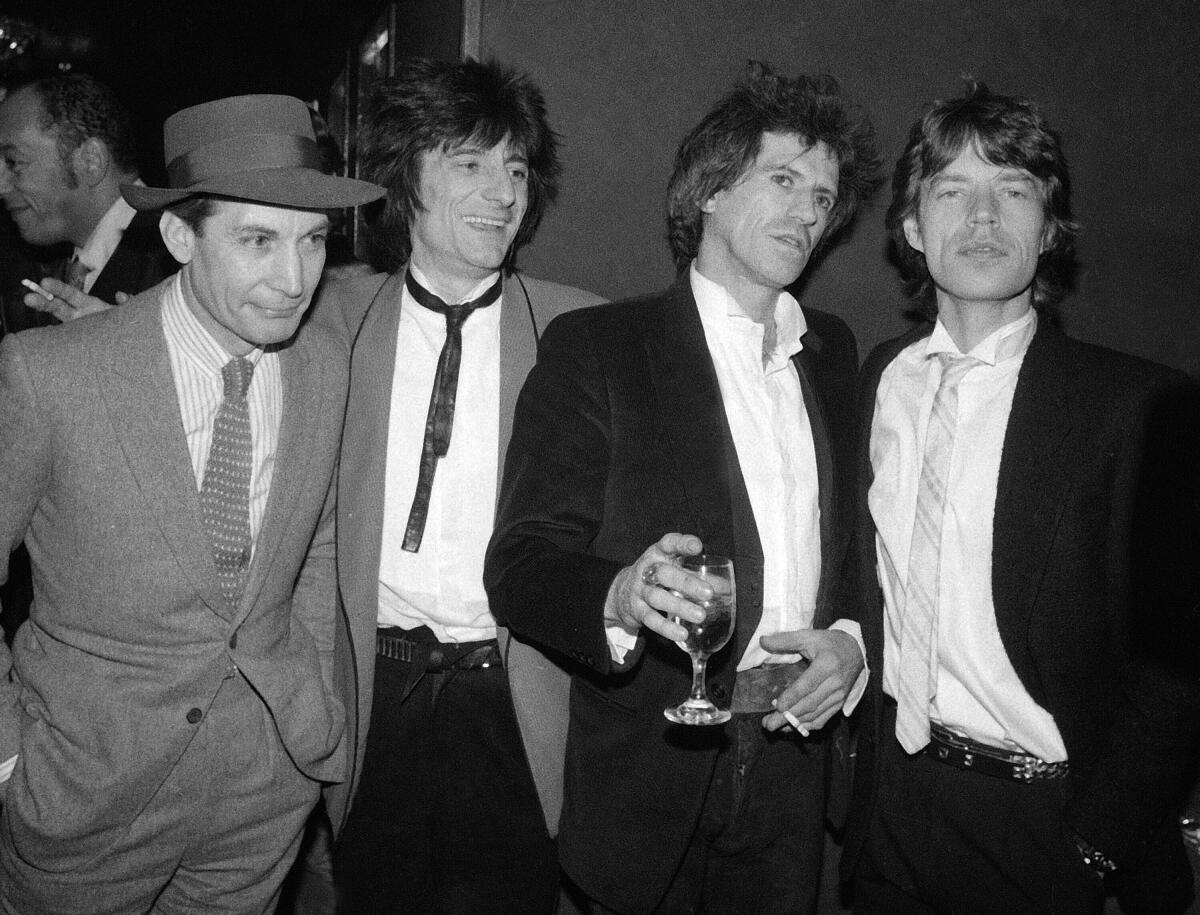‘You haven’t heard the last of Charlie’: Rolling Stones on a bittersweet tour and new music

- Share via
Tragically, the other Rolling Stones have not started referring to Mick Jagger as the Thirsty Beaver.
“At least not yet,” the 78-year-old frontman said the other day from Charlotte, N.C., where a couple of evenings before he’d enjoyed a beer at the historic dive bar of that name — then set the internet aflutter when he posted a photo of himself, ball cap pulled low, surrounded by half a dozen North Carolinians evidently unaware they were drinking next to a rock ’n’ roll legend.
“It was a pretty quiet night,” Jagger said. “I don’t think a lot happens on Wednesday in that area. But, you know, when I go to these towns, I don’t want to just stay in. I like to see something.” Indeed, not long before his moment at the Thirsty Beaver went viral, Jagger documented his visit to the Gateway Arch in St. Louis with a delightful picture in which he looks like somebody’s grandpa on holiday.
These postcards from America are the latest demonstration of Jagger’s lifelong fascination with the country that created the blues. But you can also think of his excursions as his way of making the most of a bittersweet affair: the Stones’ first tour minus their founding drummer, Charlie Watts, who died in August at age 80 (having never missed a gig, it’s said). The No Filter road show — which launched in 2017, then paused due to the COVID-19 pandemic before resuming last month for a final 13 concerts — will stop at Inglewood’s SoFi Stadium on Oct. 14 and 17 with the band’s longtime associate Steve Jordan filling in for Watts.
A weeklong Sotheby’s auction of Grateful Dead artifacts includes everything from musical instruments to t-shirts to a MacGyvered nitrous oxide kit.
The drummer’s death from an unspecified cause came as a shock to his bandmates, according to Jagger, who said they’d believed he was on the mend after an earlier medical procedure. Guitarist Ronnie Wood, 74, said he was the last of the group’s members to see Watts, weeks before he died, in a London hospital room — the same room, in fact, where Wood was treated for cancer in 2020.
“We call it the Rolling Stones suite,” Wood said with a laugh. “We watched horse racing on TV and just shot the breeze. I could tell he was pretty tired and fed up with the whole deal. He said, ‘I was really hoping to be out of here by now,’ then after that there was a complication or two and I wasn’t allowed back. No one was.”
Added Keith Richards, 77, of Watts’ passing: “I’m still trying to put it together in my head. I don’t think I can be very erudite on Charlie at the moment.”
In a sense, the Stones’ choosing to carry on without Watts is in keeping with tradition: They’ve lost other important members — from bassist Bill Wyman and guitarist Mick Taylor, both of whom quit, to the late Brian Jones, who was fired shortly before he drowned in a swimming pool in 1969 — and they’ve rarely allowed anything to get in the way of doing what they love: playing sublime bar-band rock ‘n’ roll and pocketing vast sums of money in the process. (Remaining seats for the SoFi shows top out at around $500, with tickets going for many times that on the secondary market. In 2019, the Stones’ tour grossed $177 million, according to Pollstar.)
Still, Watts’ absence feels different. Beyond his musical skills — many regarded him as the greatest drummer in rock history, with an understated swing that elevated the Stones’ music to a kind of wasted elegance — Watts was the band’s soul; for more than half a century, he brought a wit and tastefulness to the gig that crucially offset his bandmates’ bad-boy flamboyance, as at the Rose Bowl two years ago, where he sat down behind his kit and got right to driving the swarming guitars of “Street Fighting Man.” No one ever expected a rock band to stick around for as long as the Stones have. Yet Watts’ crisply reliable beat kept them sounding vital — an irreproducible blend of chaos and beauty.
“Charlie was one of the funniest guys I’ve ever known,” Richards said, “and the most unlikely man to be famous. He hated that side of the job and used to savagely take the piss out of it.” Jagger fondly recalled the old-fashioned way he kept in touch with Watts when they were off the road. “He didn’t do email or text or FaceTime, so I’d phone him and we’d talk about football,” the singer said, Watts rooting for Tottenham Hotspur and Jagger for Arsenal.
Asked how he responds to those who say the band should’ve retired after Watts’ death, Jagger said, “I don’t, really — I think you’re exaggerating.”
He’s skeptical of the idea that huge numbers of people think the Stones aren’t the Stones without Watts. “Maybe one or two do,” he said. “But I don’t think that’s a movement.” In Jagger’s view, “No band is the same when you lose someone. But the Stones is a very resilient band. We’ve been through a lot of ups and downs through the years, and we’ve had changes of personnel, as have a lot of bands.”
Following a late-career Grammy breakthrough and a best-selling memoir, Brandi Carlile returns with an ambitious new album, “In These Silent Days.”
There’s no arguing with him on that point. Steely Dan and Fleetwood Mac have toured successfully in recent years without key figures; the Eagles are scheduled to play the Forum this month with 28-year-old Deacon Frey in place of his father Glenn, who died in 2016.
“When you’re a band for this long, it’s unlikely you won’t have any changes,” Jagger continued. “Of course, this is probably the biggest one we’ve had. But we felt — and Charlie felt — that we should do this tour. We’d already postponed it by a year, and Charlie said to me, ‘You need to go out there. All the crew that have been out of work — you’re not gonna put them out of work again.’ So I think it was the right decision to keep going. The band still sounds great onstage, and everyone’s been really responsive at the couple of big shows we’ve done so far.
“They hold up signs saying, ‘We miss you, Charlie,’ and I miss him too.”
Steve Jordan, 64, who began playing with Richards in the mid-’80s as part of the guitarist’s X-Pensive Winos side project, is unconcerned with any criticism of his taking over Watts’ role. “No. 1, I’ve known Charlie since I was 19 years old,” he said. “No. 2, I’m just as devastated if not more than any fan out there about the loss. So nobody can tell me anything about that.”
Jordan, also known for his work with Eric Clapton and John Mayer, said he thinks of his job as “carrying a legacy” but that he’s “not up there to do a Charlie Watts impersonation.” He’s quoting some of Watts’ iconic fills “because that’s what the music calls for — and because they’re hooks. Charlie had a lot of hooks. But I’m also bringing the way I play to it.”

In rehearsals the band worked though 80 songs, Jordan said, including some relatively deep cuts (such as 1971’s “Moonlight Mile” and ’76’s “Memory Motel”) along with the all-time classics (e.g. “Honky Tonk Women,” “Paint It Black,” “Satisfaction”). According to published set lists, the Stones have been playing “Living in a Ghost Town,” which they finished recording last year while in COVID quarantine, and “Troubles A’ Comin,” a Chi-Lites cover that serves as one of nine previously unreleased outtakes featured on an upcoming 40th-anniversary reissue of 1981’s “Tattoo You.”
One song the band seems to have dropped from its set since the tour started up again is “Brown Sugar,” the Stones’ gleefully problematic early-’70s smash that opens on a “Gold coast slave ship bound for cotton fields.”
“You picked up on that, huh?” Richards said when asked why they’re not playing the tune. “I don’t know. I’m trying to figure out with the sisters quite where the beef is. Didn’t they understand this was a song about the horrors of slavery? But they’re trying to bury it. At the moment I don’t want to get into conflicts with all of this s—.” He laughed in his signature raspy fashion. “But I’m hoping that we’ll be able to resurrect the babe in her glory somewhere along the track.”
Jagger, as usual, was more circumspect than his freewheeling counterpart. “We’ve played ‘Brown Sugar’ every night since 1970, so sometimes you think, We’ll take that one out for now and see how it goes,” he said. “We might put it back in.” For the frontman, “the set list in a stadium show, it’s kind of a tough one” — all those thousands of people to please while you work to stay engaged yourself in the music. “We did ‘Let It Bleed’ last night, which I managed to play on 12-string guitar,” Jagger said proudly.

There’s also his famous dancing to keep himself (and us) amused. Jagger recently shared a much-discussed video in which he’s seen spinning around a rehearsal studio, jazz hands flying. Turns out he’s got “a guy on the tour,” as he put it, with whom he works on his moves-like-Jagger.
“When you’re not a trained dancer, you tend to repeat the same moves over and over,” Jagger said. “So if you have 10 good moves, it’s good to have someone to tell you, ‘Don’t forget to do this one and that one.’” (Fun fact: The frontman has seen your memes about his and David Bowie’s manic 1985 video for “Dancing in the Street,” and he approves. “It is kind of hilarious,” he said of the clip.)
Traveling dance advisor aside, the Stones’ road operation is leaner than it used to be, thanks to COVID. “I’m really stripped down bare,” Richards said. “What I’ve got is a guitar and a mask. That’s it, pal.” Wood is out with his wife, Sally, and their 5-year-old twin daughters, Alice and Gracie — “the St. Trinian’s girls, I call them,” Wood said, referring to the postwar British comic strip about a boarding school populated by young hell-raisers. “They cause wreckage behind them wherever they go. But they’ve got their mini-masks and we’re having as much fun as possible.” With chemotherapy behind him, Wood said he’s “in fine fettle” and has been keeping to a daily regimen of tai chi, yoga and “a little Boxercise.”
The pandemic slowed work on the Stones’ latest studio album, their first of original songs since “A Bigger Bang” in 2005. “If everything hadn’t gotten closed down, we might’ve finished the damn thing,” Richards said. Added Jagger: “We have a lot of tracks done, so when the tour’s finished we’ll assess where we are with that and continue.”
Both men were reluctant to describe the new music in any detail. Yet they happily confirmed that their late drummer — the steadfast presence they’ll have to get used to not seeing when they turn around onstage — laid down his parts for a number of songs before he died.
“Let me put it this way,” Richards said. “You haven’t heard the last of Charlie Watts.”
More to Read
The biggest entertainment stories
Get our big stories about Hollywood, film, television, music, arts, culture and more right in your inbox as soon as they publish.
You may occasionally receive promotional content from the Los Angeles Times.












